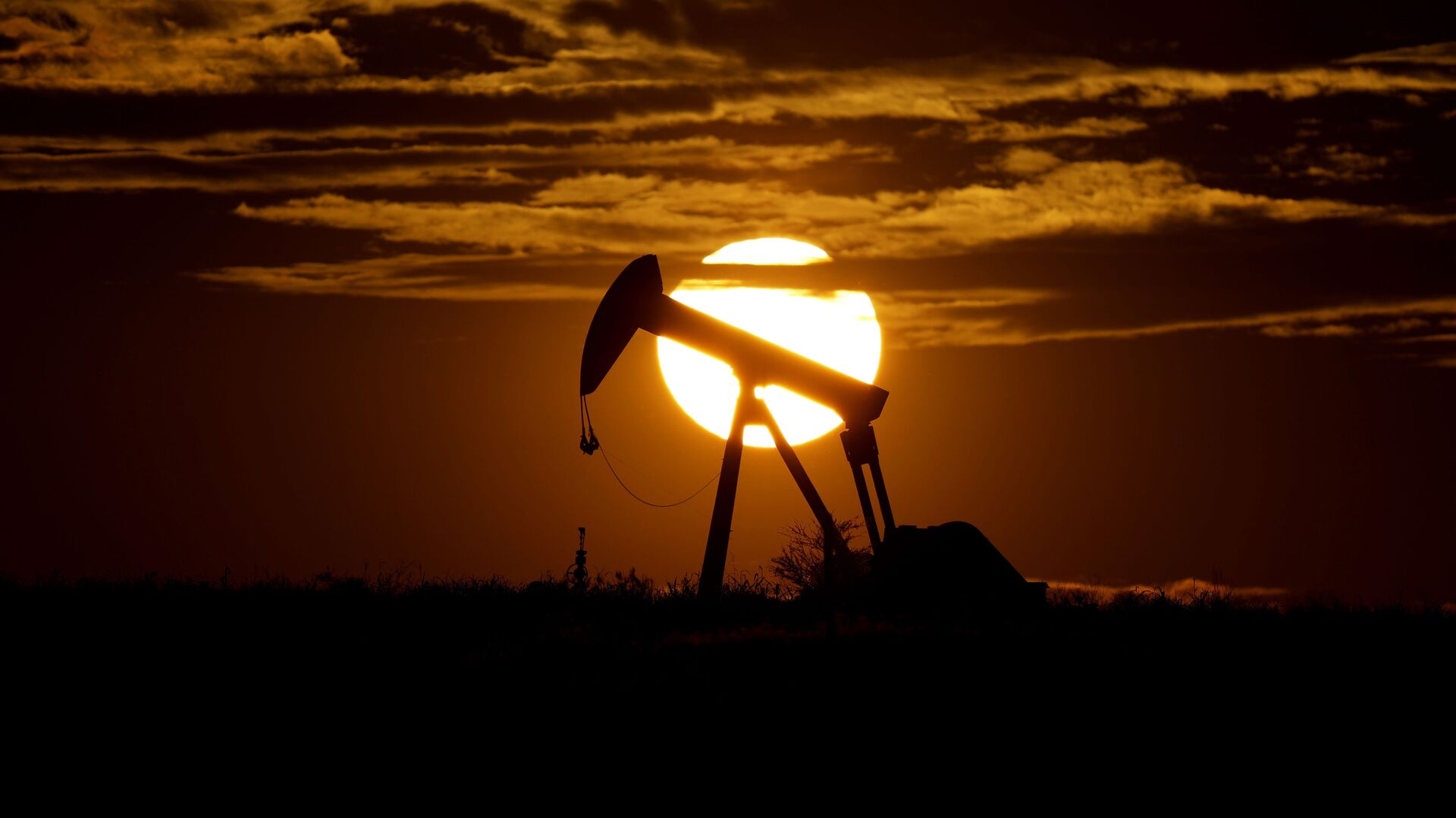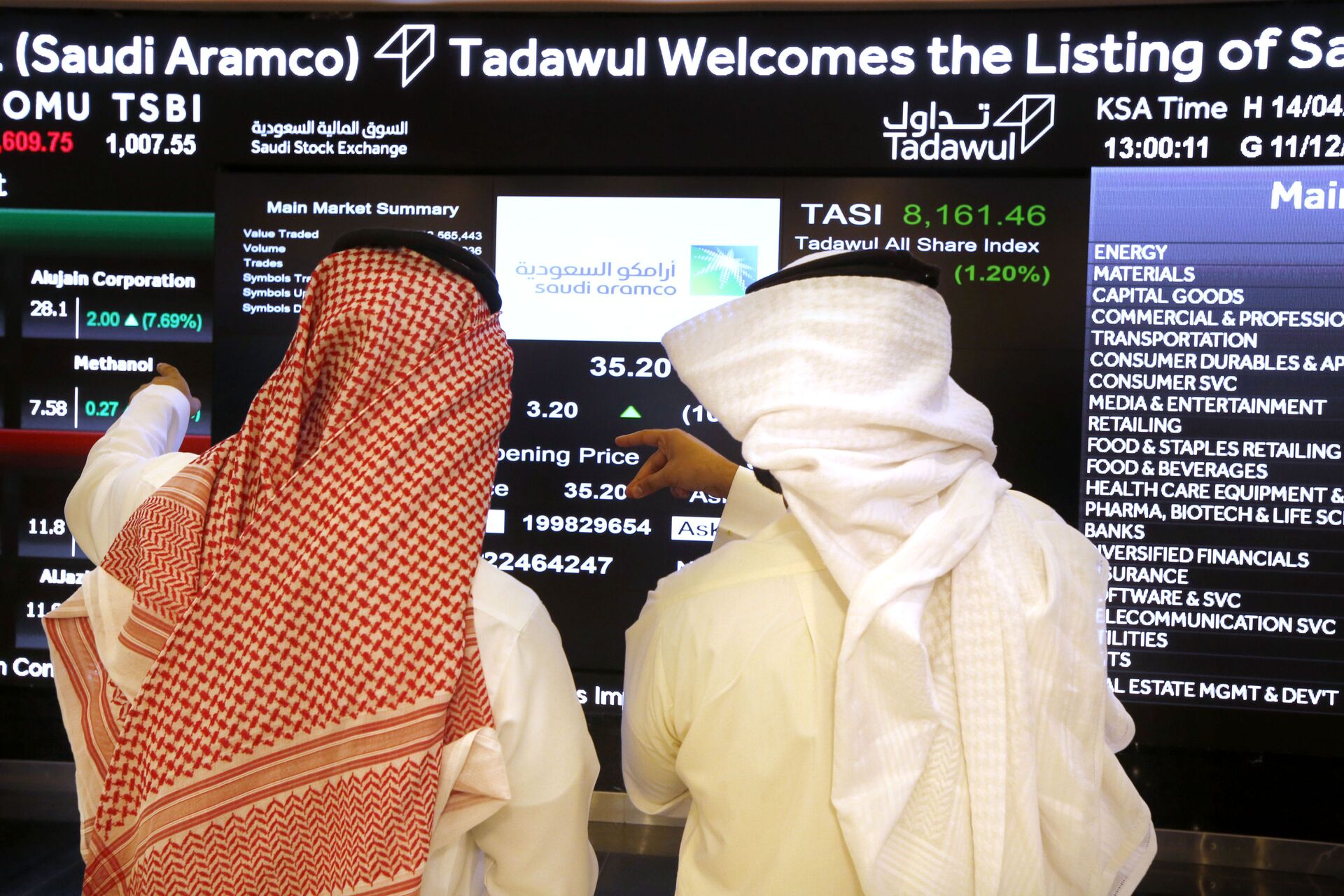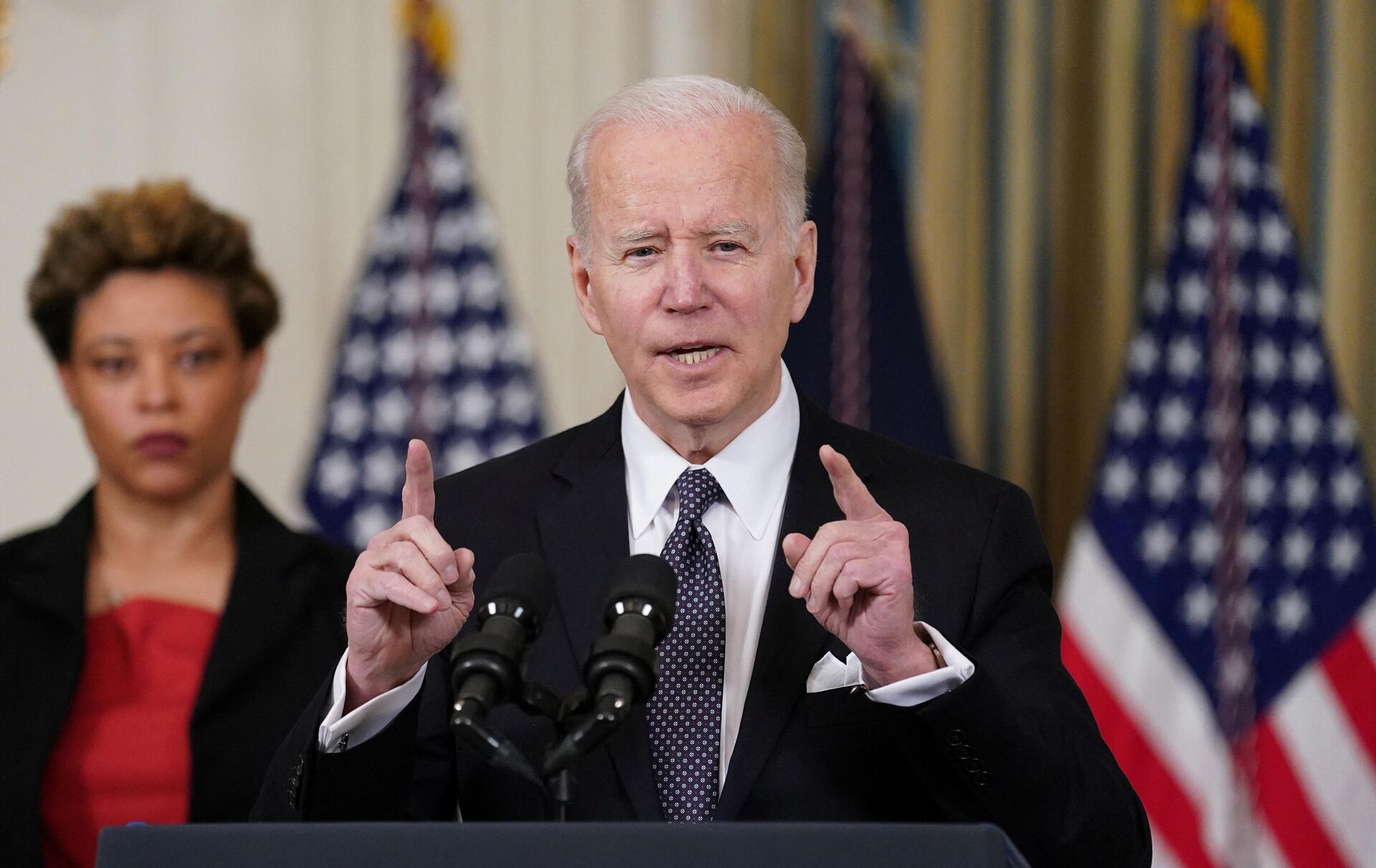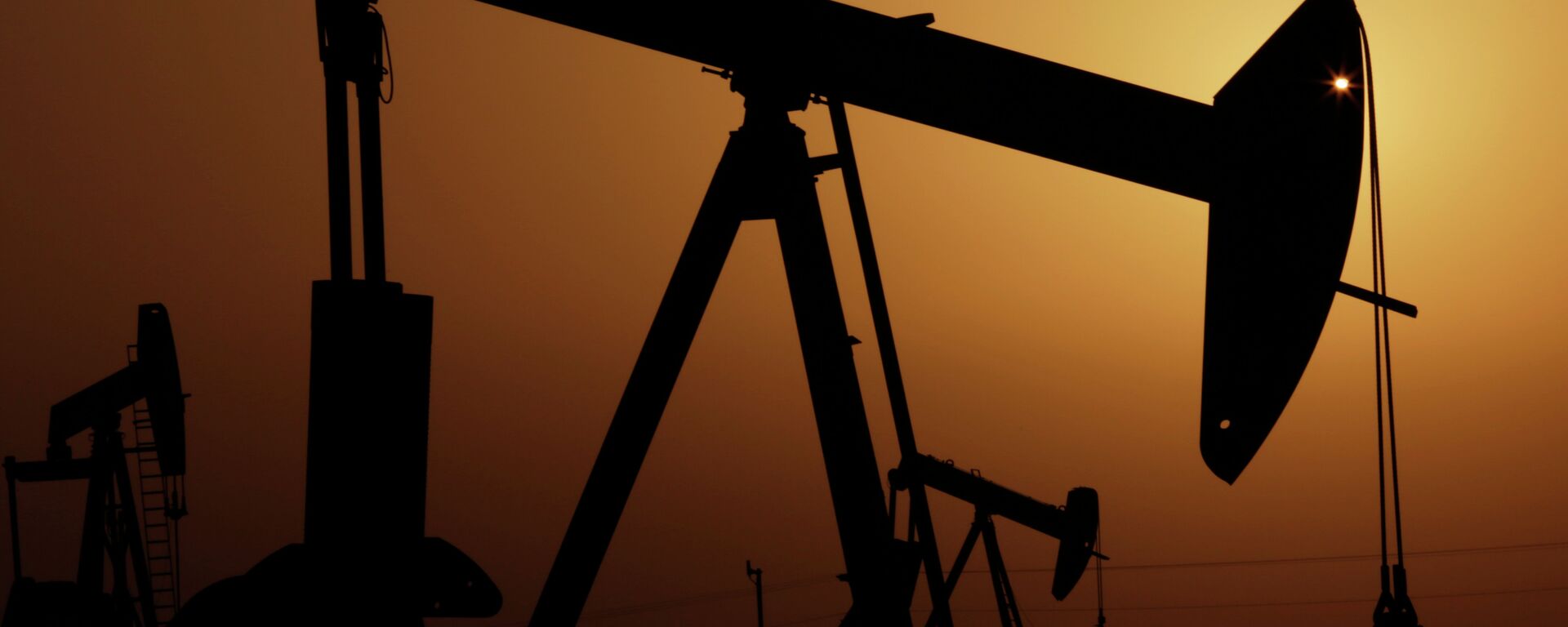https://sputnikglobe.com/20220401/chickens-have-come-home-to-roost-why-bidens-spr-release-unlikely-to-curb-oil-prices-1094400491.html
Chickens Have Come Home to Roost: Why Biden's SPR Release Unlikely to Curb Oil Prices
Chickens Have Come Home to Roost: Why Biden's SPR Release Unlikely to Curb Oil Prices
Sputnik International
US President Joe Biden on 31 March launched an unprecedented release from the American emergency crude reserve to reduce galloping gasoline prices. Earlier... 01.04.2022, Sputnik International
2022-04-01T16:21+0000
2022-04-01T16:21+0000
2022-10-19T20:35+0000
us
world
opinion
saudi arabia
middle east
uae
oil
gas prices
joe biden
us democratic party
https://cdn1.img.sputnikglobe.com/img/07e5/03/04/1082257498_0:54:3446:1992_1920x0_80_0_0_059838c27c1a65bfb3b0992164c14e14.jpg
"When US President Biden announced in the last quarter of 2021 that he is releasing 50 million barrels of oil from the United States Strategic Petroleum Reserve (SPR), the global oil market and prices virtually ignored it", says Dr Mamdouh G. Salameh, international oil economist and visiting professor of energy economics at ESCP Europe Business School, London. "Then the International Energy Agency (IEA) announced in January this year a release of 60 million barrels from the OECD countries' oil inventories, the global oil market was totally indifferent… Releasing more oil from the US SPR again isn’t going to fare better than previous releases in their impact on prices but may at least help slightly alleviate the tightness in the market".The Biden administration is expected to release one million barrels per day for six months, resulting in a total release of about 180 million barrels, according to a fact sheet released on 31 March. Even though the upcoming release is the largest release of oil in the 46-year history of the SPR, "in structural terms it only equates to approximately 1% of daily global consumption and 5% of US daily consumption", according to Justin Dargin, global energy scholar at the University of Oxford. At its current levels, the SPR holds 568.3 million barrels.Still, many oil companies view this as not being an adequate long-term solution given Biden's climate agenda and his earlier policies discouraging oil drilling, according to the scholar.What's more, the American president is planning to fine US oil drillers when federal leases go unused in an effort to force the industry into pumping more.However, Biden's "use-it-or-lose-it policy" appears to have only widened the gap between Biden and US oil explorers, who blame the president for suppressing investments in the US oil industry under his anti-fossil agenda, according to Bloomberg. Shale explorers openly say that "it’s silly to think that increasing fees on producers will result in lower energy prices", as quoted by the media outlet.To complicate matters further, US shale oil appears to be "a spent force", says Salameh.Why Gulf States Are Not Rushing to Pump More OilMeanwhile, the Gulf economies have not come to Joe Biden's rescue despite repeated requests from the White House to increase crude production.In addition to that, the UAE and Saudi Arabia have expressed security concerns that they consider the Biden administration has not addressed, namely the increasing frequency of Houthi attacks on their respective hydrocarbon infrastructure, according to Dargin. Furthermore, the Gulf monarchies are disenchanted by the White House's attempts to revive the Iran nuclear deal."I believe the refusal has more to do with economics than politics", argues Dr Gal Luft, co-director of the US-based Institute for the Analysis of Global Security and a senior adviser to the United States Energy Security Council. "It is important to note that OPEC+ is increasing oil output by increments of 400,000 barrels according to schedule. This increase may not be sharp enough for some consumers but it is not that the group is sitting on its hands. Oil exporters are very cautious. Opening the spigot too much, especially now with US SPR release, could lead to a glut and sharp fall in prices, which could be economically devastating for them".Furthermore, from OPEC’s perspective most of the oil currently missing from the market is a result of US government decisions, with some of them being unilateral, Luft stresses. One should bear in mind that sanctions on Russia, Venezuela, Iran, and Libya, as well as the mess in Iraq, "have denied the market millions of barrels per day", says the energy security expert.Dems' Election Odds Seem BleakGiven that the measures proposed by the US president are likely to have a modest temporary effect, the unfolding oil price rally may backfire on the Biden administration and the Democratic Party during the upcoming November midterms, according to the observers.The oil expert highlights that both inflation and rising gasoline prices could tip the balance against the Democratic Party’s chances of retaining control of Congress in the midterm Congressional elections in November. If the Republicans take control over the Congress, it would be very hard for Biden to push ahead with the Democratic political agenda and secure a victory for his party in 2024."With the midterm elections that are on the horizon, the White House understands that if it appears to the electorate that it is not taking decisive action, then it would not bode well for the Democratic party at the polls", says Dargin. "But the White House finds itself in a bind as its traditional party supporters tend to be more environmentally oriented".Still, even if gasoline prices stabilise "Democrats will have to put up an epic fight to maintain control over the Congress", warns Luft.
https://sputnikglobe.com/20220308/scholars-us-ban-on-russian-oil-expected-to-unleash-hell-on-consumers--upend-dems-election-odds-1093698015.html
https://sputnikglobe.com/20220321/saudi-arabia-appears-to-be-fed-up-with-americas-foreign-policy---heres-why-1094052725.html
saudi arabia
uae
Sputnik International
feedback@sputniknews.com
+74956456601
MIA „Rossiya Segodnya“
2022
News
en_EN
Sputnik International
feedback@sputniknews.com
+74956456601
MIA „Rossiya Segodnya“
Sputnik International
feedback@sputniknews.com
+74956456601
MIA „Rossiya Segodnya“
us, opinion, saudi arabia, middle east, uae, oil, gas prices, joe biden, us democratic party, us midterm elections, climate change, shale oil, fossil fuels, inflation, us congress
us, opinion, saudi arabia, middle east, uae, oil, gas prices, joe biden, us democratic party, us midterm elections, climate change, shale oil, fossil fuels, inflation, us congress
Chickens Have Come Home to Roost: Why Biden's SPR Release Unlikely to Curb Oil Prices
16:21 GMT 01.04.2022 (Updated: 20:35 GMT 19.10.2022) US President Joe Biden on 31 March launched an unprecedented release from the American emergency crude reserve to reduce galloping gasoline prices. Earlier, the US president imposed an oil embargo on Russia, but failed to convince Gulf petroleum producers to step up oil extraction.
"When US President Biden announced in the last quarter of 2021 that he is releasing 50 million barrels of oil from the United States Strategic Petroleum Reserve (SPR), the global oil market and prices virtually ignored it", says Dr Mamdouh G. Salameh, international oil economist and visiting professor of energy economics at ESCP Europe Business School, London. "Then the International Energy Agency (IEA) announced in January this year a release of 60 million barrels from the OECD countries' oil inventories, the global oil market was totally indifferent… Releasing more oil from the US SPR again isn’t going to fare better than previous releases in their impact on prices but may at least help slightly alleviate the tightness in the market".
The Biden administration is expected to release one million barrels per day for six months, resulting in a total release of about 180 million barrels, according to a fact sheet released on 31 March. Even though the upcoming release is the largest release of oil in the 46-year history of the SPR, "in structural terms it only equates to approximately 1% of daily global consumption and 5% of US daily consumption", according to Justin Dargin, global energy scholar at the University of Oxford. At its current levels, the SPR holds 568.3 million barrels.
"The Biden administration is utilising the SPR differently than it was utilised before," says Dargin. "Previously, the SPR was strategically deployed as a means to mitigate supply disruptions or refinery outages, but the Biden administration is attempting to tactically wield it to control prices".
Still, many oil companies view this as not being an adequate long-term solution given Biden's climate agenda and his earlier policies discouraging oil drilling, according to the scholar.
What's more, the American president is planning to fine US oil drillers when federal leases go unused in an effort to force the industry into pumping more.
However, Biden's "use-it-or-lose-it policy" appears to have only widened the gap between Biden and US oil explorers, who blame the president for suppressing investments in the US oil industry under his anti-fossil agenda,
according to Bloomberg. Shale explorers openly say that "it’s silly to think that increasing fees on producers will result in lower energy prices", as quoted by the media outlet.
To complicate matters further, US shale oil appears to be "a spent force", says Salameh.
"Despite rising oil prices far above shale’s break-even prices, shale producers have failed to lift their production using the pretext of capital discipline", he says. "Shale’s well productivity has been declining, steadily adding to production costs. The maximum shale oil production could rise in 2022 is 200,000-300,000 barrels a day (b/d) over the 2021 claimed average of 11.0 million barrels a day (mbd)".
Why Gulf States Are Not Rushing to Pump More Oil
Meanwhile, the Gulf economies have not come to Joe Biden's rescue despite repeated requests from the White House to increase crude production.
"The Arab Gulf States have seen the United States and the EU ignore them when there is a glut in the global oil market and rush to beg them to raise production when crude prices started to rise in what can only be described as hypocritical attitude", says Salameh. "The Gulf States along with OPEC+ want to ensure that their production policies are not influenced by political pressure from anyone and that their decisions reflect the best interests of the global oil market".
In addition to that, the UAE and Saudi Arabia have expressed security concerns that they consider the Biden administration has not addressed, namely the increasing frequency of Houthi attacks on their respective hydrocarbon infrastructure, according to Dargin. Furthermore, the Gulf monarchies are disenchanted by the White House's attempts to revive the Iran nuclear deal.
"I believe the refusal has more to do with economics than politics", argues Dr Gal Luft, co-director of the US-based Institute for the Analysis of Global Security and a senior adviser to the United States Energy Security Council. "It is important to note that OPEC+ is increasing oil output by increments of 400,000 barrels according to schedule. This increase may not be sharp enough for some consumers but it is not that the group is sitting on its hands. Oil exporters are very cautious. Opening the spigot too much, especially now with US SPR release, could lead to a glut and sharp fall in prices, which could be economically devastating for them".
Furthermore, from OPEC’s perspective most of the oil currently missing from the market is a result of US government decisions, with some of them being unilateral, Luft stresses. One should bear in mind that sanctions on Russia, Venezuela, Iran, and Libya, as well as the mess in Iraq,
"have denied the market millions of barrels per day", says the energy security expert.
"These are not acts of God but of deliberate decisions taken by Washington," he notes. "It is naive to think one can wage wars and sanctions and not pay a certain price down the road, especially when one is the biggest oil consumer in the world."
Dems' Election Odds Seem Bleak
Given that the measures proposed by the US president are likely to have a modest temporary effect, the unfolding oil price rally may backfire on the Biden administration and the Democratic Party during the upcoming November midterms, according to the observers.
"Rising domestic gasoline prices are being pushed upwards by global crude prices and also accelerating the US inflation rate, which has already hit 8.3%", says Salameh. "The rocketing energy prices and rising inflationary pressure are feeding into the cost of manufacturing and food materials and reducing the purchasing power of ordinary Americans. This is a recipe for an approaching recession in the United States."
The oil expert highlights that both inflation and rising gasoline prices could tip the balance against the Democratic Party’s chances of retaining control of Congress in the midterm Congressional elections in November. If the Republicans take control over the Congress, it would be very hard for Biden to push ahead with the Democratic political agenda and
secure a victory for his party in 2024.
"With the midterm elections that are on the horizon, the White House understands that if it appears to the electorate that it is not taking decisive action, then it would not bode well for the Democratic party at the polls", says Dargin. "But the White House finds itself in a bind as its traditional party supporters tend to be more environmentally oriented".
Still, even if gasoline prices stabilise "Democrats will have to put up an epic fight to maintain control over the Congress", warns Luft.
"If history is our guide, unified governments, in which the president and both chambers of congress are controlled by one party, do not last more than two years", the energy security expert emphasises. "Bush, Obama, and Trump all enjoyed unified government in part of their presidency, but lost control over at least one chamber in the midterms. Biden is likely to join this list".






